外研 高中英语必修4Module 2Grammar(共24张PPT)
外研 高中英语必修4Module 2Grammar(共24张PPT)
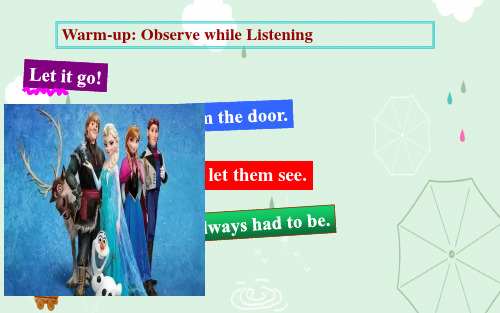
昨日的明天是今天。明天的昨日是今天。为什么要计较于过去呢(先别急着纠正我的错误,你确实可以在评判过去中学到许多)。但是我发现有的人过分地瞻前顾后了。为 何不想想“现在”呢?为何不及时行乐呢?如果你的回答是“不”,那么是时候该重新考虑一下了。成功的最大障碍是惧怕失败。这些句子都教育我们:不要惧怕失败。如 果你失败了他不会坐下来说:“靠,我真失败,我放弃。”并且不是一个婴儿会如此做,他们都会反反复复,一次一次地尝试。如果一条路走不通,那就走走其他途径,不 断尝试。惧怕失败仅仅是社会导致的一种品质,没有人生来害怕失败,记住这一点。宁愿做事而犯错,也不要为了不犯错而什么都不做。不一定要等到时机完全成熟才动手。 开头也许艰难,但是随着时间的流逝,你会渐渐熟悉你的事业。世上往往没有完美的时机,所以当你觉得做某事还不是时候,先做起来再说吧。喜欢追梦的人,切记不要被 梦想主宰;善于谋划的人,切记空想达不到目标;拥有实干精神的人,切记选对方向比努力做事重要。太阳不会因为你的失意,明天不再升起;月亮不会因为你的抱怨,今 晚不再降落。蒙住自己的眼睛,不等于世界就漆黑一团;蒙住别人的眼睛,不等于光明就属于自己!鱼搅不浑大海,雾压不倒高山,雷声叫不倒山岗,扇子驱不散大雾。鹿 的脖子再长,总高不过它的脑袋。人的脚指头再长,也长不过他的脚板。人的行动再快也快不过思想!以前认为水不可能倒流,那是还没有找到发明抽水机的方法;现在认 为太阳不可能从西边出来,这是还没住到太阳从西边出来的星球上。这个世界只有想不到的,没有做不到的!不是井里没有水,而是挖的不够深;不是成功来的慢,而是放 弃速度快。得到一件东西需要智慧,放弃一样东西则需要勇气!终而复始,日月是也。死而复生,四时是也。奇正相生,循环无端,涨跌相生,循环无端,涨跌相生,循环 无穷。机遇孕育着挑战,挑战中孕育着机遇,这是千古验证了的定律!种子放在水泥地板上会被晒死,种子放在水里会被淹死,种子放到肥沃的土壤里就生根发芽结果。选
外研版高中英语必修4 module 2课文翻译(带要点)

高中英语课本必修四重点课文英汉对照高效辅导—————————————————————————————————————————————————————————————————————————Module 2 T raffic Jam——Getting Around in Beijing 行在北京T axis 出租车Taxis are on the streets 24 hours a day. 北京大街上的出租车时24小时服务的。
Simply raise your hand, and a taxi appears in no time.只要你招招手,立刻就有出租车。
They are usually red, and they dis play the price per kilometer on the window. 他们通常都是红色车身,并且在车窗上显示每公里的路价。
Y ou should check the cab has a business permit, and make sure you ask for a receipt.你要做的就是确定司机有营运执照并且索要发票。
Buses and trolleybuses 公交车和电车Public transport provides a cheap way to get around in Beijing. 公共交通为人们游览北京提供了低价位的出行方式。
There are 20,000 buses and trolleybuses in Beijing, but they can get very crowded. 北京大约有2万多辆公交车和电车。
It’s a good idea to avoid public transport during the rush hour (6:30 am – 8:00 am and 5:00 pm – 6:30 pm).但是,它们有时候会很挤,最明智的做法就是避免高峰期(上午6:30---8:00 下午5:00---6:30)乘坐公交车和电车。
2019年春外研版高中英语必修二课件:Module 2 Writing(共12张PPT)

1. Greeting: “Dear 【Name】” 2. Introduction: Say why you wrote the letter What you want to tell the reader (What the read wants to hear) 3. Conclusion: Make plans for next time 4. Signing off: “Sincerely,”
Up to now, smoking has been regarded as a acceptable pastime. In fact, nicotine is a drug, and smokers become addicted to it. With so much evidence to show how bad smoking is, the next time someone asks: “Do you mind if I smoke?” we should say, “Yes, I mind for you, and for me.”
Task
Write a E-mail to your pad about the harm caused by
smoking
Skills building 1: Form of an E-mail
Just like the form of a letter, an E-mail should include at least four items:
2. Write down the words and expressions that you have learned in this unit because you might use them in your writing.
英语:Module 2《Traffic Jam》教案-Grammar(外研版必修4)
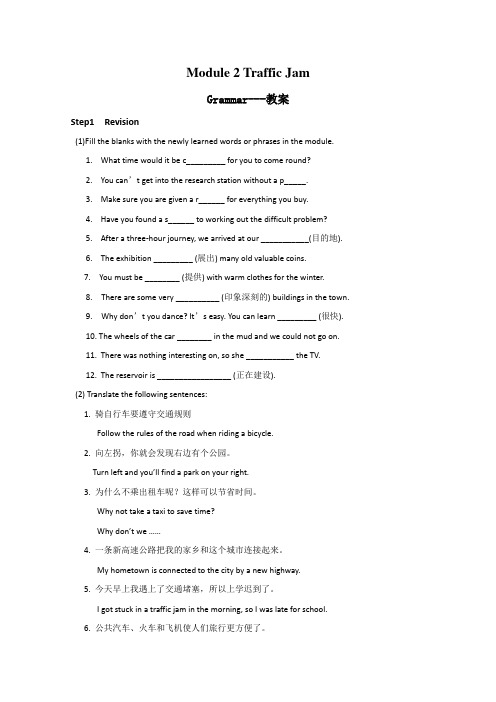
Module 2 Traffic JamGrammar---教案Step1 Revision(1)Fill the blanks with the newly learned words or phrases in the module.1.What time would it be c_________ for you to come round?2.You can’t get into the research station without a p_____.3.Make sure you are given a r______ for everything you buy.4.Have you found a s______ to working out the difficult problem?5.After a three-hour journey, we arrived at our ___________(目的地).6.The exhibition _________ (展出) many old valuable coins.7. You must be ________ (提供) with warm clothes for the winter.8. There are some very __________ (印象深刻的) buildings in the town.9. Why don’t you dance? It’s easy. You can learn _________ (很快).10. The wheels of the car ________ in the mud and we could not go on.11.There was nothing interesting on, so she ___________ the TV.12.The reservoir is _________________ (正在建设).(2)Translate the following sentences:1. 骑自行车要遵守交通规则Follow the rules of the road when riding a bicycle.2. 向左拐,你就会发现右边有个公园。
外研 高中英语必修4Module 2 Grammar精品课件
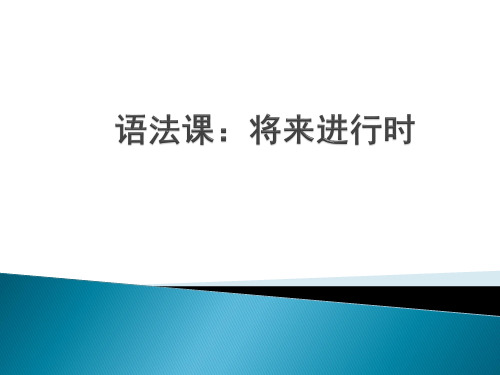
外研 高中 英语必 修4Mod ule 2 Gramma r精品 课件
表示根据计划,安排或预测要发 生的动作,有具体的时间状语。
What will you be doing on July 12, 2019?
I will be doing….. We shall be doing ……
外研 高中 英语必 修4Mod ule 2 Gramma r精品 课件
外研 高中 英语必 修4Mod ule 2 Gramma r精品 课件
let's do some exercises!
外研 高中 英语必 修4Mod ule 2 Gramma r精品 课件
外研 高中 英语必 修4Mod ule 2 Gramma r精品 课件
What's your plan about the summer vocation?
1. Do you know what “IT” stands for?
Information technology
2. Would you like to do a job related to “IT”?
3.If someone is an enthusiastic and skillful computer programmer or user, what can we call him/her?
future.
外研 高中 英语必 修4Mod ule 2ule 2 Gramma r精品 课件
将来某一时刻或某一时间段 正在进行的动作
What will you be doing
at 5.00 tomorrow afternoon?
外研 高中 英语必 修4Mod ule 2 Gramma r精品 课件
外研版高中英语必修4 Module2 Grammar精品课件
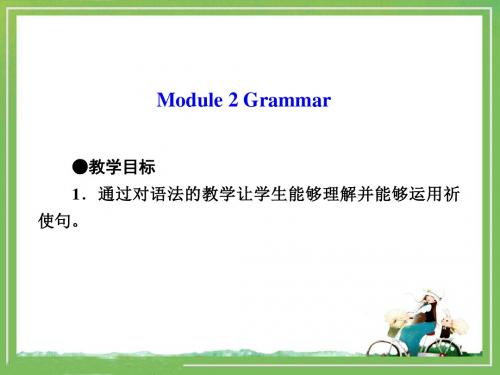
(2)“祈使句+or+陈述句”,此句型中,祈使句与陈 述句表示一种否定条件关系,or意为“否则”。
Tell me the truth,or you'll regret it. 告诉我真相,否则你会后悔的。 【提示】 (1)在上述两个句型中陈述句的时态往往使 用一般将来时(will do)表示。 (2)在上述句型中,有时祈使句仅使用一个名词短语来 充当。 Two more dollars,and the T-shirt is yours. 再加两美元,那么这T恤就是你的了。 A few more minutes,and the work will be finished. 再有几分钟,这工作就完成了。
气。
【答案】 B
9.—How can I apply for an online course?
—Just fill out this form and we what we can do for
you.
A.see
B.are seeing
C.have seen
D.will see
【解析】 句意:——我怎样申请一个网上课程?——
A.Don't
B.Not to
C.Not
D.No
【解析】 句意:不要用眼睛看太阳,你的眼睛会受
伤的。考查祈使句的否定形式,句首加don't。
【答案】 A
5.Let us take care of grandma,
?
A.shan't we
B.shall we
C.will you
D.don't you
●教学地位 GRAMMAR部分语法处理祈使句。该部分附有三个 活动,第一个活动帮助学生认识这种语法现象;其余两个 活动为巩固性活动。
2019外研版高中英语选择性必修二Unit4 Using language 课件

Grammar: It as an empty subject Rewrite the underlined parts using it as an empty subject.
According to the “2017 Hollywood Diversity Report”, to get roles in American film and television is no longer quite so difficult for women and minorities. This is another small but important advance against gender and racial discrimination.
5) It is a pity / shame / ... that ... 例如:It is a pity that you didn’t see such a good film.
真可惜你没看到这么好的电影。
6) It happens / seems / looks / appears / ... that ... 例如:It happens that I know him.
it is no longer quite so difficult for women and minorities to get roles in American film and television
Grammar: It as an empty subject Rewrite the underlined parts using it as an empty subject.
Grammar: It as an empty subject Look at the sentences and answer the questions. Sentences (a) and (c) are from the reading passage.
外研版高一英语必修2_Module4_Grammar_公开课课件

It is no use/useless/no good/ no value/nice/worth/a waste of time doing something
Correct the mistakes. 1. It is no use(good) to cry after failure.
crying
1.to do 和-ving用法有什么区别?
思考 A. 主动 进行; 用途; 抽象 习惯性动作 B.具体或将来 2.以上 to do和-ving在句中分别做什么成分?做宾语的是第
_2__句。
Class inquiry 1 ---to do and –ving used as object
1. I can’t imagine l_i_v_i_n__g(live) in a lonely place. 2. You should avoid _m__a_k__i_n_g_(make) the same mistake . 3. I’m looking forwart toh_e_a__r_i_n_g_(hear) from you.
B.hope wish expect agree learn fail decide plan promise refuse manage offer would like(love)等
C.begin start continue
D. remember forget regret stop go on mean try等
E. need require want
____A____跟动词-ving形式做宾语
__B______ 跟to do 做宾语
____C____跟to do和-ving形式做宾语意义无区别的
高一英语必修4(外研版)2-3 Grammar
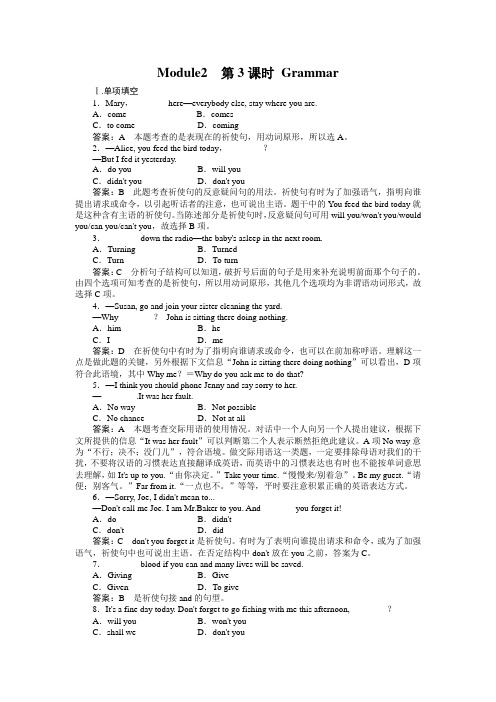
Module2 第3课时GrammarⅠ.单项填空1.Mary,________here—everybody else, stay where you are.A.come B.comesC.to come D.coming答案:A本题考查的是表现在的祈使句,用动词原形,所以选A。
2.—Alice, you feed the bird today,________?—But I fed it yesterday.A.do you B.will youC.didn't you D.don't you答案:B此题考查祈使句的反意疑问句的用法。
祈使句有时为了加强语气,指明向谁提出请求或命令,以引起听话者的注意,也可说出主语。
题干中的Y ou feed the bird today就是这种含有主语的祈使句。
当陈述部分是祈使句时,反意疑问句可用will you/won't you/would you/can you/can't you,故选择B项。
3.________down the radio—the baby's asleep in the next room.A.Turning B.TurnedC.Turn D.To turn答案:C分析句子结构可以知道,破折号后面的句子是用来补充说明前面那个句子的。
由四个选项可知考查的是祈使句,所以用动词原形,其他几个选项均为非谓语动词形式,故选择C项。
4.—Susan, go and join your sister cleaning the yard.—Why________?John is sitting there doing nothing.A.him B.heC.I D.me答案:D在祈使句中有时为了指明向谁请求或命令,也可以在前加称呼语。
理解这一点是做此题的关键,另外根据下文信息“John is sitting there doing nothing”可以看出,D项符合此语境,其中Why me?=Why do you ask me to do that?5.—I think you should phone Jenny and say sorry to her.—________.It was her fault.A.No way B.Not possibleC.No chance D.Not at all答案:A本题考查交际用语的使用情况。
高中英语新课标外研版必修4教案 Period2 Grammar;Function;Pronunciation(Module5 A Trip Along the Three
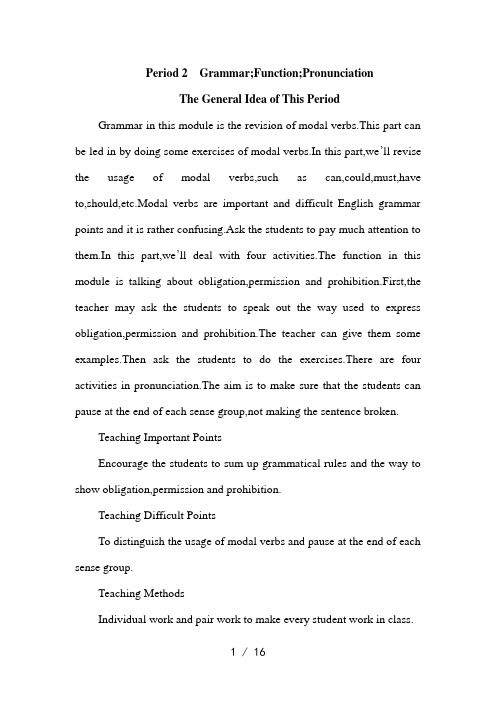
Period 2Grammar;Function;PronunciationThe General Idea of This PeriodGrammar in this module is the revision of modal verbs.This part can be led in by doing some exercises of modal verbs.In this part,we’ll revise the usage of modal verbs,such as can,could,must,have to,should,etc.Modal verbs are important and difficult English grammar points and it is rather confusing.Ask the students to pay much attention to them.In this part,we’ll deal with four activities.The function in this module is talking about obligation,permission and prohibition.First,the teacher may ask the students to speak out the way used to express obligation,permission and prohibition.The teacher can give them some examples.Then ask the students to do the exercises.There are four activities in pronunciation.The aim is to make sure that the students can pause at the end of each sense group,not making the sentence broken.Teaching Important PointsEncourage the students to sum up grammatical rules and the way to show obligation,permission and prohibition.Teaching Difficult PointsTo distinguish the usage of modal verbs and pause at the end of each sense group.Teaching MethodsIndividual work and pair work to make every student work in class.Teaching AidsMultimedia,tape-recorder & a blackboardThree Dimensional Teaching AimsKnowledge and SkillsMake the students master modal verbs and use them correctly.Make sure the students can show their obligation,permission and prohibition properly.Train the students’ pronunciation and pause at the end of each sense group.Teaching and StrategiesMotivate the students’ enthusiasm in taking part in the class.Feelings and ValueThrough the revision of modal verbs and the way to show obligation,permission and prohibition,the students will surely express themselves correctly and properly.Teaching ProceduresStep 1 Revision(Greet the students as usual.>T:First,I’ll show you a short passage and you give me the missing words in the passage A Trip Along the Three Gorges.(Show the following passage on the screen.>In August,1996,Peter Hessler,a young American teacher of English,and a colleague decided to take a boat 1along the ThreeGorges.They bought tickets 2the Jiangyou boat.They left the docks on a beautiful afternoon.As the sun set they 3at Fengdu.They slept through the first gorge,which is called the Qutang Gorge.At Wushan they made a 4up the Daning river.The next day they went through the Wu Gorge.They passed the Xiang River,home of Qu Yuan,the 3rd century BC 5.Along the Yangtze River,every rock looked like a person or animal,every stream that joined the great river 6its legends,every hill was 7 with the past.As they came out of the third gorge,the Xiling Gorge,they sailed into the 8site of the dam.On a distant mountain was a sign 920-foot characters.”Build the Three Gorges Dam,10 the Yangtze River,” it said.After three minutes’preparation,ask several students to share their answers in the whole sentences.Then check the answers from the whole class.Suggested answers:1.downstream2.for3.docked4.detour5.poet6.carried7.heavy8.construction9.in10.ExploitAsk the students to read the whole passage together.Step 2 GrammarT:Okay,so much for the check-up.Now,we are going to revise modal verbs.How much do you know about modal verbs?Let me give you a quiz about modal verbs.Let’s see how much do you know about them.(Show the following sentences on the screen.>Decide whether the sentences are true(T> or false(F>.1.Modal verbs have only one form in the present tense.(>2.Modal verbs all have a present,past and future form.(>3.Some modal verbs have more than one meaning.(>4.Modal verbs are followed by the infinitive with to.(>5.To ask questions with modal verbs you use the auxiliary verb do.(>6.To make a modal verb negative you use don’t.(>Ask the students to finish them individually,and then call back their answers.Suggested answers:1.T2.F3.T4.F5.F6.FT:No.2,4,5 and 6 are wrong statements.Do you know how to correct them?Who’d like to do No.2.(Encourage the students to volunteer to answer your questions.>S a:Not all modal verbs have a present,past and future form.For example:Must only has one form.T:Wonderful job!No.4.S a:Modal verbs are followed by the infinitive without to.T:Yes,good.We all know modal verb +原形v.<Finish the four questions like this.)T:I can see you have know the basic rules of modal verbs.Let’s do some other practice.Look at Activity 1.The sentences are all from the passage in plete them and answer the questions following them.(Show the following sentences on the screen.>1.They __________go anywhere they wished.2.You __________go on those ships.3.There __________be any other foreigners.4.We just __________show our passports.5.We __________see the sun setting behind the white pagoda.1.Which verb is used as the past of must?2.Which verb indicates an ability to do something?3.Which verb makes a prediction about the future?4.Which verb is used to give advice?5.Which verb indicates the permission to do something?They are easy for the students to answer.Suggested answers:1.could2.shouldn’t3.won’t4.had to5.could1.had to2.could3.won’t4.shouldn’t5.couldT:So much for this activity.I think you have got a good understanding of modal verbs.Let’s do a further exercise.Please underline the correct verb in the following sentences.(Show the following on the screen.>1.You should/shouldn’t visit the Three Gorges.They’re beautiful.2.Boats can/can’t reach the upper part of the Yangtze River.It’s too dangerous.3.You should/shouldn’t go in winter.The water’s too low.4.Travellers must/mustn’t show their documents when they arrive.It’s the law.5.They could/couldn’t see the mountains in the distance.The peaks were shining in the sunlight.6.The children could/couldn’t find their way out of the woods.They were lost.7.Peter had to/must return by the end of February.He started work again in March.This part is also easy to do.After two or three minutes’preparation,ask the students to say the words they choose individually.Suggested answers:1.should2.can’t3.shouldn’t4.must5.could6.couldn’t7.had toThen pair the students to ask and answer questions based on the sentences in the activity above,that is,Activity 3.Have them take turns toask and answer.Two minutes later,ask some pairs to do questions and answers for the whole class.Step 3 FunctionT:That’s the end of grammar.After class,do more exercises to consolidate modal verbs.Now,look at Page 45.We’ll talk about obligation,permission and prohibition.Do you have any idea of the way to show them?First,for obligation.Any volunteer?S a:We can use You must/should/ought to ...T:Yes,good idea!We can also use sentence pattern,such as:It is necessary to/that...You are required to...As for permission,what kind of sentence do we learn?S b:You may or can...T:Good suggestion!Besides,we can use You are allowed to...I think you are clever to say expressions for prohibition,right?Ss:You can’t/mustn’t... and don’t...T:Good job!Now,let’s see some examples in Activity 1.(Show the following questions on the screen.>Choose the correct meaning.1.The captain lets passengers use his cabin.(a>Passengers must use the captain’s cabin.(b>Passengers can use the captain’s cabin.(c>Passengers mustn’t use the captain’s cabin.2.There are lectures—but you don’t have to go to them.(a>It is necessary to go to the lectures.(b>It isn’t necessary to go to the lectures.(c>It isn’t possible to go to the lectures.3.Swimming form the boat is forbidden.(a>You can swim from the boat.(b>You must swim from the boat.(c>You mustn’t swim from the boat.4.You’re not allowed to smoke.(a>It is against the rules to smoke.(b>You can smoke if you wish.(c>You don’t have to smoke.5.Passengers are required to take their passports with them.(a>They can take their passports with them.(b>They can’t take their passports with them.(c>They must take their passports with them.Ask the students to do this activity individually,then check with a partner.Call back the answers from the whole class,having one student read the sentence,and another one the paraphrase.Suggested answers:1.b2.b3.c4.a5.cAsk the students to use the italicized verbs in each sentence(lets/don’t have to/is forbidden/not allowed to/are required to> to make a sentence of their own study and life.Then encourage some students to share their sentences.Another task is Activity 2.Find more examples of be allowed,had to and let in the reading passage on page 42 in Reading and vocabulary Activity 2.Suggested answers:Paragraph 1:We just had to show our passports and they let us get on the boat.Paragraph 5:but we weren’t allowed to get off the boat.Step 4 PronunciationT:Listen to the following sentences and repeat them.Meanwhile,make sure you pause at the end of each sense group.(Show the following on the screen.>Can you tell me/something about the boats?What about/on board activities?What about/swimming in the Yangtze?Are there any/other rules I should know about?Pair them to practice,listening and helping each other to get it right.And then say the sentences in Activity 2 aloud.What about swimming in the Yangtze?Are there any other rules I should know?Can you tell me if we’re allowed to take photos of the dam?Ask the students to read them individually,and then play the tape for them to check.Suggested answers:What about/swimming in the Yangtze?Are there any/other rules I should know?Can you tell me/if we’re allowed to take photos of the dam?T:In Activity 3,there is a short dialogue from the passage in listening Activity 1.Read through the sentences to yourselves and try to pause at the end of each sense group.A I’m interested in booking a classic Three Gorges cruise.Can you tell me something about the boats?B Yes,certainly.They’re big,modern boats,and they all have professional English speaking directions.You can choose between western and Chinese cuisine.Play the tape for them to check their answers.Then call back theanswers from the whole class.Suggested answers:A I’m interested in booking/a classic Three Gorges cruise./Can you tell me/something about the boats?B Yes,/certainly./They’re big,/modern boats,/and they all have/professional English speaking directions./You can choose between/western and Chinese cuisine.T:Let’s come to another exercise.There is also a dialogue in Activity4.Read through these sentences and pause at the end of each sense group.A Are there any other rules I should know?B There aren’t a lot of rules.But the boats are non-smoking,so you’re not allowed to smoke anywhere except in your cabin and in the smoking lounge.Suggested answers:A Are there any other rules/I should know?B There aren’t a lot of rules./But the boats are non-smoking,/so you’re not allowed to smoke/anywhere except in your cabin/and in the smoking lounge.Step 5 Summary and homeworkT:Today we have learned some modal verbs and some way to show obligation permission and prohibition.We’ve also learned how to pause at the end of each sense group.Do more practice after class.Do the exercise on your workbook.So much for today.Good-bye,everyone!Ss:Good-bye,teacher!The Design of the Writing on the BlackboardModule 5 A Trip Along the Three GorgesThe second periodcan/could have to/must should/ought toobligationpermission prohibitionRecord after Teaching_______________________________________________________ ________________________________________________________________________ ________________________________________________________________________ _________________Activities and Research1.Revise the usage of modal verbs.2.Learn to express obligation,permission and prohibition.3.Practise how to pause at the end of each sense group correctly.Reference for TeachingGrammar1.can 和 couldcan表示客观可能性,也可表示”能力”。
- 1、下载文档前请自行甄别文档内容的完整性,平台不提供额外的编辑、内容补充、找答案等附加服务。
- 2、"仅部分预览"的文档,不可在线预览部分如存在完整性等问题,可反馈申请退款(可完整预览的文档不适用该条件!)。
- 3、如文档侵犯您的权益,请联系客服反馈,我们会尽快为您处理(人工客服工作时间:9:00-18:30)。
Turn right.
Don’t go faster than 90 kph.
Don’t turn left.
一、形式
Don’t walk.
Do型பைடு நூலகம்
Don’t stop
No parking
1. They give advice. 2. They give instructions. 3. They give information. 4. They give permission.
e.g. Do be careful next time! 下次一定要仔细!
Do tell me where to buy the tickets for
the concert.
告诉我去哪里买音乐会的票。
2. 动词前加上主语。
e.g. Mary, come here 玛丽,过来。 You,be quiet! 你,安静点!
2. _C_a_l_l _m_e__to_m__o_r_r_o_w_ (明天打给我) and I’ll let you know the lab result.
3. _H__u_r_ry__u_p__o_r_e_ls_e_ (快点,否则)you'll be late.
A Serious traffic jam
四、祈使句+and/or (otherwise)+陈述句
and表顺承关系,意为“那么”; or (otherwise)表转折关系意为“否则”。
Useyour head, and you will find a way.
=If you use your head, you will find a way. 动动脑筋,你将会找到方法。
Read these dos and don’ts for motorists stuck in a traffic jam. Tick the ones you agree with.
Dos □Switch off the motor. □Turn on the car radio. □Speak to your passengers. □Follow the rules of the road. □Keep cool.
二、祈使句的反意疑问句
1. 祈使句为肯定句, ——————,will you/won't you?
2. 祈使句为否定句, ——————, will you?
3. Let开头的祈使句, Let's ————, shall we? Let us ————,will you?
三、祈使句的强调形式
1. 谓语动词前加上do。
指令;命令 信息;情报 允许;许可
No smoking
No littering
No Pets
Be型
➢Be quiet! ➢Be relaxed! ➢Be yourself!
Let the pedestrians first!
Let型
e.g. Let's have a meeting this afternoon. Let us have a try if you don't want to.
Hurry up, or you'll be late.
=If you don't hurry up, you'll be late. 快点,否则你将会迟到了。
完成句子
1. _R__ea_d__t_h_is__st_o_r_y_,_a_n_d__y_o_u_w__il_l_r_e_a_li_z_e (读 这个故事,你会明白) that not everything can be bought with money.
1. Review Grammar. 2. Finish the exercises 1-3 on page 73.
对话感知 A: Don't smoke in the room, will you? B: Ah, I'm sorry, I won't. A: Come to have dinner with us this evening,
will you/won't you? B:Yes, my pleasure. A: Let's take a walk after supper, shall we? B. A good idea, I'd like to. A: Let us go swimming, Mum, will you? C: Of course, go ahead!
S2:
ID: a driver with “road rage” (路怒症)
Task: 1. to comfort the driver 2.to give advice on how to avoid road rage
✓ Be relaxed! ✓ Let the fresh air in! ✓ Listen to some light music! ✓ Don't quarrel while driving. ✓ Take a family portrait. ✓ Think the fine and result! ✓ Take a rest at the road!
Don’ts □Leave the motor on. □Blow your horn. □React when others drive badly. □Break the rules of the road. □Get angry.
Imagine you are a:
S1:
ID: a driver's wife/husband or friend
Warm-up: Observe while Listening
Don't let them in,don't let them see.
Module 2 Traffic Jam
Grammar Imperatives
What's wrong with it?
Look at the signs and say what they do.
